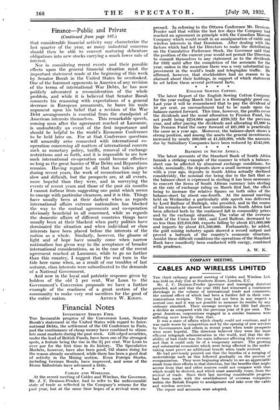BANKING IN SOUTH AFRICA.
The latest accounts of the Standard Bank of South Africa furnish a striking example of the manner in which a balance- sheet can be affected by abnormal exchange conditions, for while, nominally, the deposits show a. small increase compared with a year ago, deposits in South Africa actually declined considerably, the nominal rise being due to the fact that as the balance-sheet is expressed in sterling it has been necessary to convert the items of South African currency into sterling at the rate of exchange ruling on March 31st last, the effect being to increase the relative figures on both sides of the balance-sheet by about one-fourth. At the annual meeting held on Wednesday a particularly able speech was delivered by Lord Balfour of Burleigh, who presided, and in the course of his remarks he showed how conditions in South Africa had been affected both by the continued fall in commodity prices and by the exchange situation. The value of the overseas trade of the Union for 1931, said Lord Balfour, decreased by no less than £22,616,000, exports falling by about £11,000,000 and imports by about 111,560,000. Fortunately, he added, the gold mining industry again showed a record output and proved a bulwark of the country's economic structure. Amidst these difficult conditions the operations of the Standard Bank have manifestly been conducted with energy, combined with prudence. A. W. K.






























 Previous page
Previous page